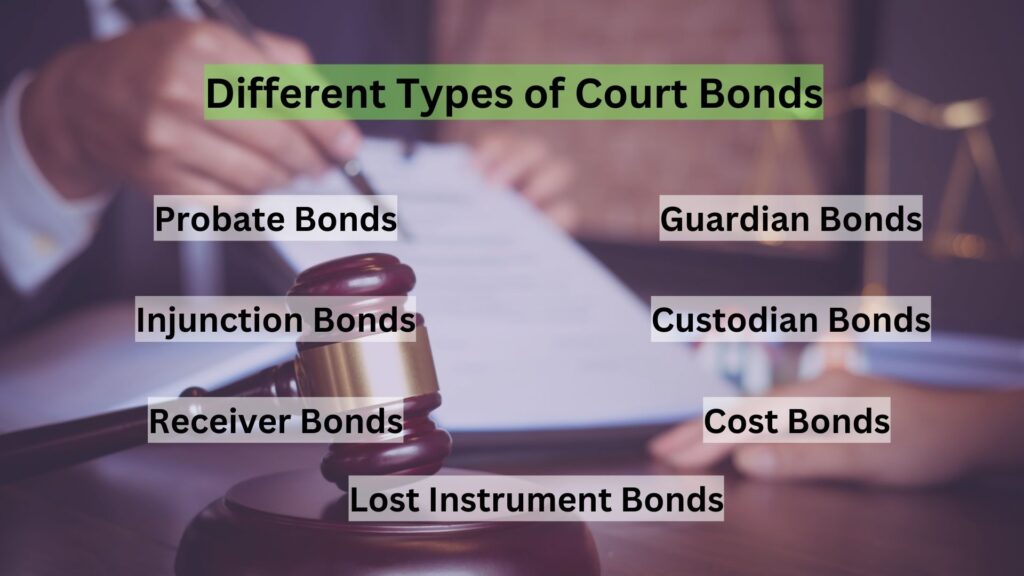Court Bonds
What Is a Court Bond?
What Is the Purpose of a Court Bond?

Different Types of Court Bonds
Court bonds, also known as judicial bonds or litigation bonds, are a type of surety bond that courts may require from individuals involved in legal proceedings. These bonds serve as a guarantee that the bonded party will fulfill their legal obligations and responsibilities. There are several types of court bonds, each serving a specific purpose. Some common types of court bonds include:
Appeal Bonds: An appeal bond is required when a party wishes to appeal a court judgment. It ensures that if the appeal is unsuccessful, the appellant will pay the original judgment amount plus any additional costs and damages incurred during the appeal process.
Probate Bonds
Probate bonds, also known as fiduciary bonds, are required from executors, administrators, and guardians involved in managing the assets and affairs of an estate or a minor. These bonds ensure that the bonded party will faithfully carry out their duties and protect the interests of the beneficiaries.
Injunction Bonds
An injunction bond is required when a court grants an injunction or restraining order against a party. The bond ensures that if the court later finds the injunction was wrongfully issued, the party who obtained the injunction will cover any damages incurred by the restrained party.
Receiver Bonds
A receiver bond is necessary when a court appoints a receiver to take custody of and manage property or assets that are the subject of a legal dispute. The bond provides assurance that the receiver will fulfill their responsibilities and protect the assets in their custody.
Guardian Bonds
Guardian bonds are required for individuals appointed as guardians for minors or incapacitated adults. The bond ensures that the guardian will act in the best interest of the ward and properly manage their financial affairs.
Custodian Bonds
Custodian bonds are similar to guardian bonds and are required when a person is appointed as a custodian for assets belonging to a minor under the Uniform Gifts to Minors Act (UGMA) or the Uniform Transfers to Minors Act (UTMA).
Lost Instrument Bonds
A lost instrument bond is required when a negotiable instrument, such as a check or a stock certificate, is lost or destroyed. The bond indemnifies the issuer against any potential losses if the original instrument is later found or presented for payment.
Cost Bonds
A cost bond is required to cover court costs and legal fees in certain legal proceedings. It ensures that the prevailing party will be reimbursed for their expenses if they win the case.
These are some of the most common types of court bonds. The specific bond requirements and amounts may vary depending on the jurisdiction and the nature of the legal matter. It’s essential to consult with a qualified surety bond professional to understand the specific bond requirements for a particular legal case.
Benefits of Court Bonds
Court bonds, also known as judicial bonds or litigation bonds, offer various benefits to the parties involved in legal proceedings and the court system. Some of the key advantages of court bonds include:
Legal Compliance
Court bonds are often required by law or court rules to ensure that parties involved in specific legal actions comply with their legal obligations. Posting a bond demonstrates a party’s willingness to abide by court orders and fulfill their responsibilities.
Financial Protection
Court bonds provide financial protection to the prevailing party in a lawsuit. If the bonded party fails to fulfill their obligations or comply with court orders, the bond serves as a source of compensation for the damages suffered by the prevailing party.
Encouraging Appeals
Appeal bonds play a vital role in the appeals process. By requiring an appellant to post a bond before filing an appeal, the court ensures that the prevailing party’s rights are protected. This requirement can discourage frivolous or meritless appeals.
Protecting Estates and Beneficiaries
Probate bonds, also known as fiduciary bonds, protect the assets and beneficiaries of estates. They provide assurance that the executor or administrator will act in the best interest of the estate and distribute assets correctly.
Ensuring Guardianship Responsibilities
Guardian bonds provide an added layer of protection for minors or incapacitated adults under the care of a guardian. They ensure that the guardian will carry out their responsibilities diligently and responsibly.
Facilitating Receivership
Receiver bonds are essential in cases where a court appoints a receiver to manage assets or property during legal proceedings. The bond assures the court and interested parties that the receiver will fulfill their duties impartially and professionally.
Encouraging Compliance with Injunctions
Injunction bonds serve as a deterrent against frivolous injunction requests. The party seeking an injunction must post a bond, which provides compensation to the restrained party if the injunction is later found to be unwarranted.
Prompt Resolution of Lost Instrument Cases
Lost instrument bonds expedite the resolution of cases involving lost or destroyed negotiable instruments. They allow the issuer to replace the instrument promptly and avoid delays in financial transactions.
Financial Assistance for Court Costs
Cost bonds ensure that the prevailing party will receive reimbursement for their court costs and legal fees, providing financial assistance in complex or protracted legal disputes.
Improving Court Efficiency
By requiring parties to post court bonds, the court system can manage risks and streamline the legal process. Bonds reduce the burden on courts and promote efficient resolution of legal matters.
Overall, court bonds are valuable tools that protect the interests of all parties involved in legal proceedings, uphold the integrity of the court system, and contribute to the fair and efficient administration of justice.
What Are the Requirements for Obtaining a Court Bond?

What Are the Risks Associated With Court Bonds?
What Happens if a Court Bond Is Not Honored?
How Are Court Bonds Calculated?